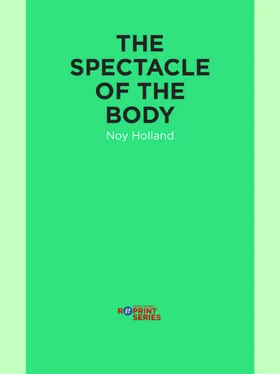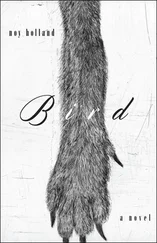Arnold comes first thing the next morning. He has been thinking about Paducah, he says.
Verda feeds RC his breakfast.
Arnold picks at the surplus cheese.
“Wouldn’t it be nice?” he says.
“What’s that?”
“Paducah.”
He walks to the chair with a crumb of cheese and holds it out to RC. He says, “Come on, Verda.”
When Ida comes, she calls Opal, and Opal arrives in her yellow dress. Verda wears gloves and a pillbox hat and sits in the truck with her hands in her lap while Arnold and Opal get in on either side of her. Arnold arranges his arm against Verda’s neck, along the back of the seat of the truck. They wave good-bye to Ida.
The concrete road to Paducah, Ida knows, is newly blacktopped, the days it used to take to go becoming shorter hours, the road beneath become so smooth, a body barely knows that she has gone when she has come back. When the sound of the truck has died away over the hill from Verda’s store, Ida cuts away the Visqueen, opens a high window. She pulls away the streamers, the tattered crepe springing free and slowly twisting down. She piles the crepe with the slack balloons she snaps away from the rafters, carries the pile behind the store and drops it in the weeds.
RC is sleeping easy. She slips his socks off. She fills a bucket.
The trouble was, the first time, the shotgun, the buckshot, and RC alone at the Feed and Seed, delirious and weary. Ida knows enough to use a bullet to get it done right this time.
She finds a sponge, a bar of soap. RC moves his head around, waking up, looking out for Verda. Ida tugs his shirt off, lathers his chest and arms. She lets him work his finger in under the band of her girdle.
When she has gotten RC cleaned up, and gotten the gun cleaned and loaded, Ida fills two cups with gin. She finds the photograph, the one that Arnold took, in the bank box, and she slips it into her girdle until she is ready to show it to RC. They drink the gin; she cracks his toes, clips his curling toenails.
In the photograph, Verda’s hair is brilliant. Her face looks smooth and young. RC’s one eye has wandered. The shadows cast by the overhead light collect in the hole in RC’s face where his other eye used to be.
Ida strokes his eyelid, touches her lips to his thumb.
“It’s all right,” she says. “This old life, RC. This old scrubby nothing.”
When the others get back from Paducah, Ida tells them, “RC, he did it again. He did it again. Go see.”
We turn out.
We close the stores and the schools to see them drive RC’s pine casket on the bed of the truck through town. Never mind the aluminum mall; never mind the stop signs. We elbow, we bustle and weep on the sidewalks to toss our coins and flowers in when Arnold’s truck creeps by.
When the truck swings wide to take the turn, we retrieve our shovels. We do not carry them out to Laurel Dale where the rest of the husbands are buried. We go back among the Silver Queen that volunteers each spring.
We rest, and dig, and rest a time. We get our ropes rolled under the casket.
There are wreaths, of course, shoots of corn; there are the pearly, wafery scales we are saving in our pockets.
We toss the coins onto the burnished clay, the flowers. The clay sticks to the blades of our shovels.
Here is how we tell it: RC, he had a accident.
We cannot remember all of it. We cannot begin to tell it quite the way RC would have told it.
We sit; we wait.
Arnold is hauling the head of the fish up the hill in a wagon, its wide mouth tattered, its eye a mucky blue.
“That’s good,” Verda says. “That’s good, old man. This way, we can bury it with him.”
We leave a portrait on the headstones of the dead of Union City. There are portraits of Ida and her husband, of Opal and hers, on the faces of the granite in Laurel Dale that mark where their husbands lie. They are imposed on porcelain ovals: Ida in a blue dress, Opal in yellow. Below them, past the hyphen that follows the day they were born, is a flat stretch with a modern gloss to be chinked on the day they are buried.
It is our way of letting the men of our town take their wives to the grave.
If you come to our town, take State Route 3 up the hill to the store. You will see where the storefront is brighter — the clean shade beneath the plank where the head of the fish was hung.
We have been sitting along the porch steps, sitting along the church pew. See where our pants and skirts have smudged the skiff of pollen?
It is how you will know we have been here. It is how you will know we have gone.
Injera is bread.
Wiha is the word for winter.
Tejj is a wine made from honey, drunk thick from a slim-mouthed vase.
We were two.
“In our country. .” he began.
I did not drink the water. The tejj was poured from a blue teapot carried low against a big man’s leg. It was a tin room, without windows. Two boys kicked a ball beyond the door. A ball is a wad of plastic wrapped with what string there is.
He tore away a piece of injera .
We had each washed one hand.
Injera is softer than other bread, cool and damp, like the touch of certain fingers. There are pores. It is as large as the platter it is served on, or larger, the fringe of it overhung. But I was not hungry.
“Eight years of water and injera ,” he said. “For eight years, home was a cell so small, I could not turnaround. The ceiling touched my head.”
There were new moons of dirt beneath the fingernails of just-washed hands.
It was a time of many days, many places.
Beyond the door, a third boy came, smaller than the others, his small legs bowed; also a goat, dragging its tether.
“In the time of the revolution,” the man said, “children were picked up off the streets by soldiers. The soldiers asked them where they lived.”
Yedoro wot is a preparation of highly spiced fowl, mostly chicken, ladled onto injera beside a mound of ground beans. To eat, you tear away a piece of injera , beginning with the fringe, working inward. Into this, cupping injera in your hand, you pinch yedoro wot , beans. The hand works like a claw.
“They would carry the children to their homes,” the man said, “to their parents. Do not imagine that the soldiers would not wait if the parents happened not to be home. That the parents watched, that they were made to watch, this was part of it.”
Tena yisTillin is “hello.”
The hand works like a claw.
Addis Ababa means “the new flower,” a name chosen by the Empress Taitu, who was barren, who was buried in a hill above the hills of the city. In Addis Ababa, when a child is born, the afterbirth is buried on either side of the door to the house. For a male child, it is buried to the right of the door in hopes he will find his way. The afterbirth of a girl goes to the left of the door to the house, in the path of the man she will marry.
I cannot say what difference there is between losing your right hand or your left hand, having lost neither hand, and having known only, in the path of my life, the private revolutions of the privileged. The hand had been lopped off, well above what would have been the man’s wrist, and not long before the time I speak of. These are mere assumptions, of course, based on how I see.
He chewed loudly, with his mouth open.
Skin had puckered over the blunted limb as though the hand were not lost but had in some way retreated, pulled back, fisting skin into the flesh of the man’s arm, the arm bloating, yellow as an old bruise.
Carrying me, my mother dreamed my body moved through her, into her neck, her shoulder. I moved into the back of her hand.
Читать дальше











